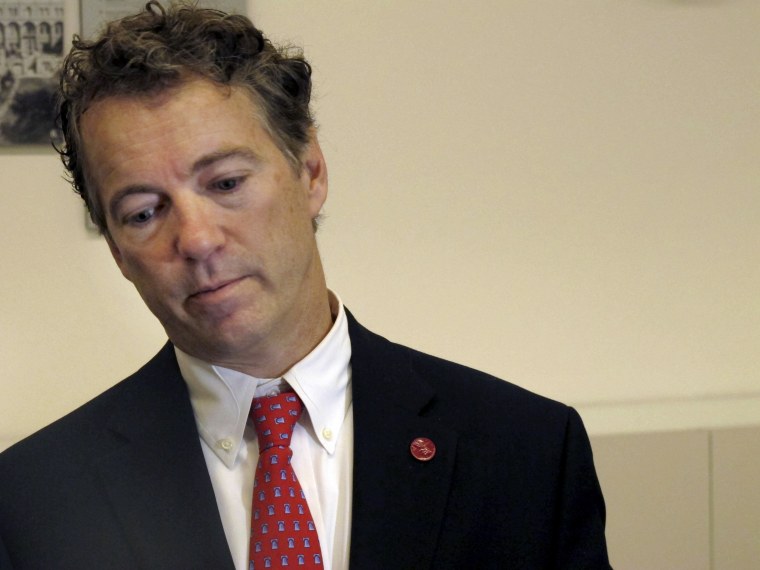Republican Sen. Rand Paul argued he has never opposed the Civil Rights Act in a speech to a largely African American audience at Howard University Wednesday morning.
"No Republican questions or disputes civil rights," he said. "I've never waived in my support for civil rights, or the Civil Rights Act."
But that's not what the Kentucky senator said three years ago—and his admission was caught on camera.
In a 2010 interview with a Kentucky newspaper, Paul questioned Title II, the provision that barred private businesses from discriminating against customers on the basis of race. At that time he told Louisville-Courier Journal , “I don’t like the idea of telling private business owners—I abhor racism. I think it’s a bad business decision to exclude anybody from your restaurant—but, at the same time, I do believe in private ownership.”
Flash forward to Paul's speech at Howard University on Wednesday, part of the Republican party's outreach to minority voters, a member of the audience called Paul out on his 2010 interview, and his subsequent claim that he never opposed the act. "This was on tape," the audience member said.
"I have been concerned about the ramifications of certain portions of the Civil Rights Act beyond race as they are now being applied to smoking, menus...and guns," Paul said in response. "I do question some of the ramifications and extensions but I've never questioned the Civil Rights Act and never come out in opposition to the Civil Rights Act."
His only references to voting rights came as he bashed the Democratic Party for having historically supported voter suppression and disenfranchisement in the decades leading up to the 1960's. Later a student questioned him more specifically on the issue, referencing the recent Republican-led voter suppression campaign. "How can we believe what you're saying in regard to voting rights?" he asked.
Paul responded that he was trying to start an "open dialogue" on behalf of his party and immediately turned back to the point that Democrats historically supported Jim Crow and other minority voter suppression tactics.
"I think if you liken using a drivers license to a literacy test, you demean the horror of what happened in the 40's and 50's," he said "It was horrific. Nobody is in favor of that. Nobody is in favor of that, but showing your drivers license in order to have an honest election. I think is not unreasonable, and I think that's the main thing Republicans have been for."
Civil Rights icon John Lewis, a Democratic colleague of Paul's in the House, has argued otherwise. Lewis, who fought and was attacked fighting for voting rights in the South, has said that “Voter ID is almost like a poll tax, it’s a form of a literacy test.”
The crowd applauded twice during the speech: once when a protester came in with a banner that appeared to read "Howard University doesn't support White Supremacists" and later when Paul talked about introducing a law to repeal mandatory minimum sentences for nonviolent offenders.
Paul rhetorically asked during his speech about "how did the party that elected the first black U.S. senator, the party that elected the first 20 African American congressmen, how did that party become a party that now loses 95% of the black vote?"
"How did the party of the great emancipator lose the trust and faith of an entire race?"
But the closest he came to answering that question came when he talked about Democratic support of big government.
"Democrats still promise unlimited federal assistance," he said, contrasting it with Republican approach of free markets. He acknowledged the former could be more attractive because it is "tangible, puts food on the table," but argued it "too often doesn't lead to jobs," and that the Republican approach will "stimulate growth."
That answer, albeit more eloquent, bears resemblance to remarks from Mitt Romney in 2012, who explained boos he received at an NAACP speech by saying, “If you’re looking for free stuff you don’t have to pay for? Vote for the other guy, that’s what he’s all about, okay? That’s not, that’s not what I’m about.”
